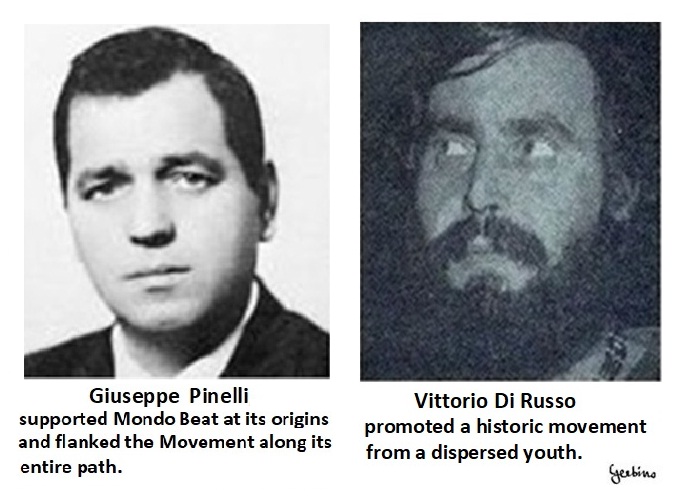
Giuseppe Pinelli, the trustee of the Milanese anarchist section Sacco e Vanzetti, supported Mondo Beat at its origins and flanked the Movement on its journey.
Vittorio Di Russo created a historic movement from a disoriented youth.
On the terror strategy and the death of Giuseppe Pinelli.
In this chapter the pages of the first issue of Mondo Beat magazine will be reproduced. These pages were printed in Milan in the anarchist section "Sacco e Vanzetti" thanks to the support of its trustee, Giuseppe Pinelli. In the current reconstruction of the history of the Mondo Beat Movement, Giuseppe Pinelli's participation will be widely documented, now it is time to talk about his death, which occurred in 1969, that is, two years after the era of Mondo Beat. In that period the Contestation manifested itself massively in Italy and the establishment, to contain the masses, had to resort to the so-called strategia del terrore (terror strategy), which consisted of exploding bombs in banks, railway stations, squares crowded with people, bombs which were attributed to the action of anarchists, while in reality the bombs were planted by the Italian secret services.
The first of these bombs exploded on December 12, 1969, inside the Banca dell'Agricoltura, Piazza Fontana, Milan. It killed 17 people and wounded 88.
Three days after this event, that is, on December 15, 1969, Giuseppe Pinelli was killed with a karate blow to the back of the head in a room on the fourth floor of the Milan Police Headquarters. Then his body was thrown out of a window, to simulate a suicide.
What we know for sure about Giuseppe Pinelli's death is that at the Milan Police Headquarters they had questioned him during three days, to obtain false testimony from him, as they wanted to blame an innocent anarchist for the terrorist attack on the Banca dell'Agricoltura. The innocent anarchist was Pietro Valpreda, who had been chosen as a scapegoat because he was the double of Antonio Sottosanti, known as Nino il Fascista (Nino the Fascist), who was the one who had actually planted the bomb in the bank.
At the Police Headquarters, they wanted Giuseppe Pinelli declare that on December 12, that is to say the day of the explosion of the bomb in the Banca dell'Agricoltura, he saw the anarchist Pietro Valpreda in Milan, who abitually lived in Rome. They wanted this false statement in order to incriminate the anarchist Pietro Valpreda for the attack. Obviously, at the Police Headquarters they knew well that Nino the Fascist was the culprit and that the attack had been planned by the secret services. And in fact the magistrate Giancarlo Stiz, who had to shed light on this event, wrote that all the traces of the attack led to the Italian secret services and finally to the NATO.
Going back to Giuseppe Pinelli, who had been under pressure for three days and three nights at the police headquarters, as he knew Pietro Valpreda and Nino the Fascist personally, he understood the imbroglio in which they wanted to involve him and to a certain moment he said out loud that the culprit was Nino the Fascist. Whereupon Police Commissioner Luigi Calabresi, fearing their plan to indict the anarchist Pietro Valpreda could be thwarted by Pinelli, killed him with a karate kick to the back of the head. Pinelli's body was then thrown out of a window, to simulate a suicide.
In the room where the murder took place, there were Giuseppe Pinelli and four police commissioners, namely Luigi Calabresi, Antonino Allegra, Antonio Pagnozzi, Marcello Guida, and a lieutenant of the carabinieri, Sabino Lo Grano, was also present, who prepared a report of what happened with Giuseppe Pinelli and handed it over to a general, his superior. In turn, that carabinieri general issued a public statement on the murder of Giuseppe Pinelli, and he did so because bad blood always flows between the carabinieri and the police. This statement on the death of Giuseppe Pinelli, which corresponds to what has been described so far, cannot be erased from historical memory, since it was published in the newspapers.
Furthermore, a few days after the explosion of the bomb in the Banca dell'Agricoltura, everyone in Milan knew that the culprit was Nino the Fascist. He was a homosexual and a few days before planting the bomb in the bank, he had told a group of young boys that he was going to do an action that all the newspapers in the world would have written about. As some of those kids ended up in a rehabilitation institute, when the bomb exploded, they told their guardians about Nino the Fascist. Thus, the news spread throughout Milan. Giangiacomo Feltrinelli, a famous publisher, declared: "Sottosanti plants the bombs but they blame the anarchists" and this statement was published verbatim by the weekly L'Espresso. But Nino the Fascist, ignored by the judiciary, lived the rest of his life undisturbed and died of natural causes in 2004. The judiciary, after 50 years of trials, having found no guilty, sentenced the relatives of those who died in the Banca dell'Agricoltura to court costs. Italian masks are world famous, especially the classic ones, those with wigs.
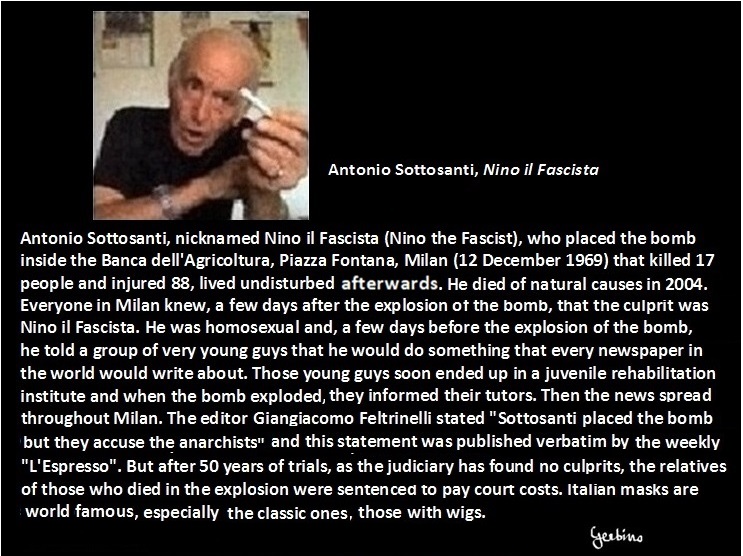
Antonio Sottosanti, Nino il Fascista
In the current reconstruction of the history of the Mondo Beat Movement, we will return to Nino il Fascista, since he had some implications in it.
"Mondo Beat Numero Unico" (Issue 1)
- November 15, 1966 - Edition: 860 copies.
Note. Melchiorre Gerbino typed the mimeograph matrices for this issue. Due to the exaggerated pressure with which he typed on the matrices (he had never done this work before), he caused lacerations from which ink leaked during printing, consequently of the 1000 copies of this issue only 860 were clearly legible and were put into circulation.
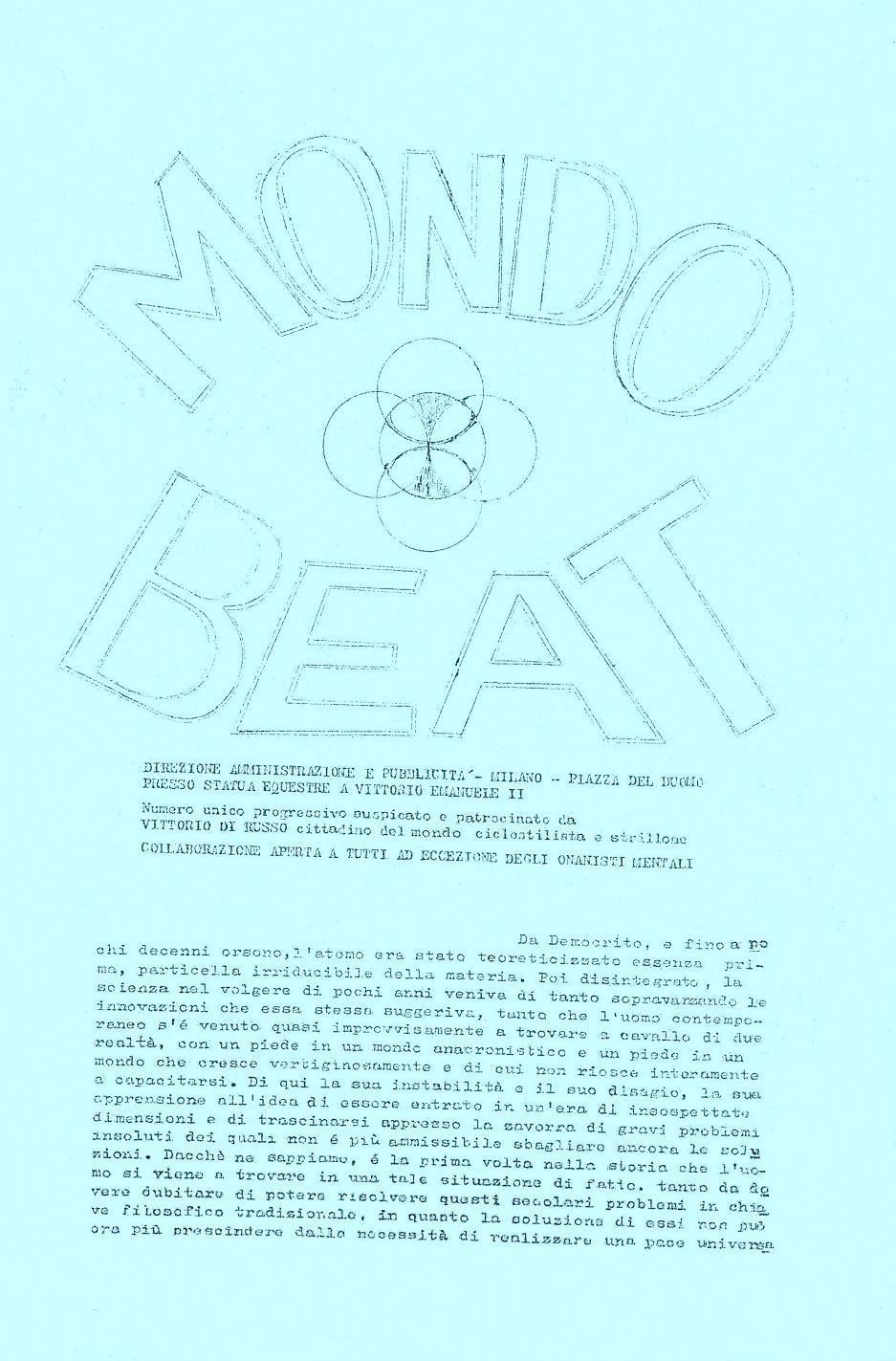
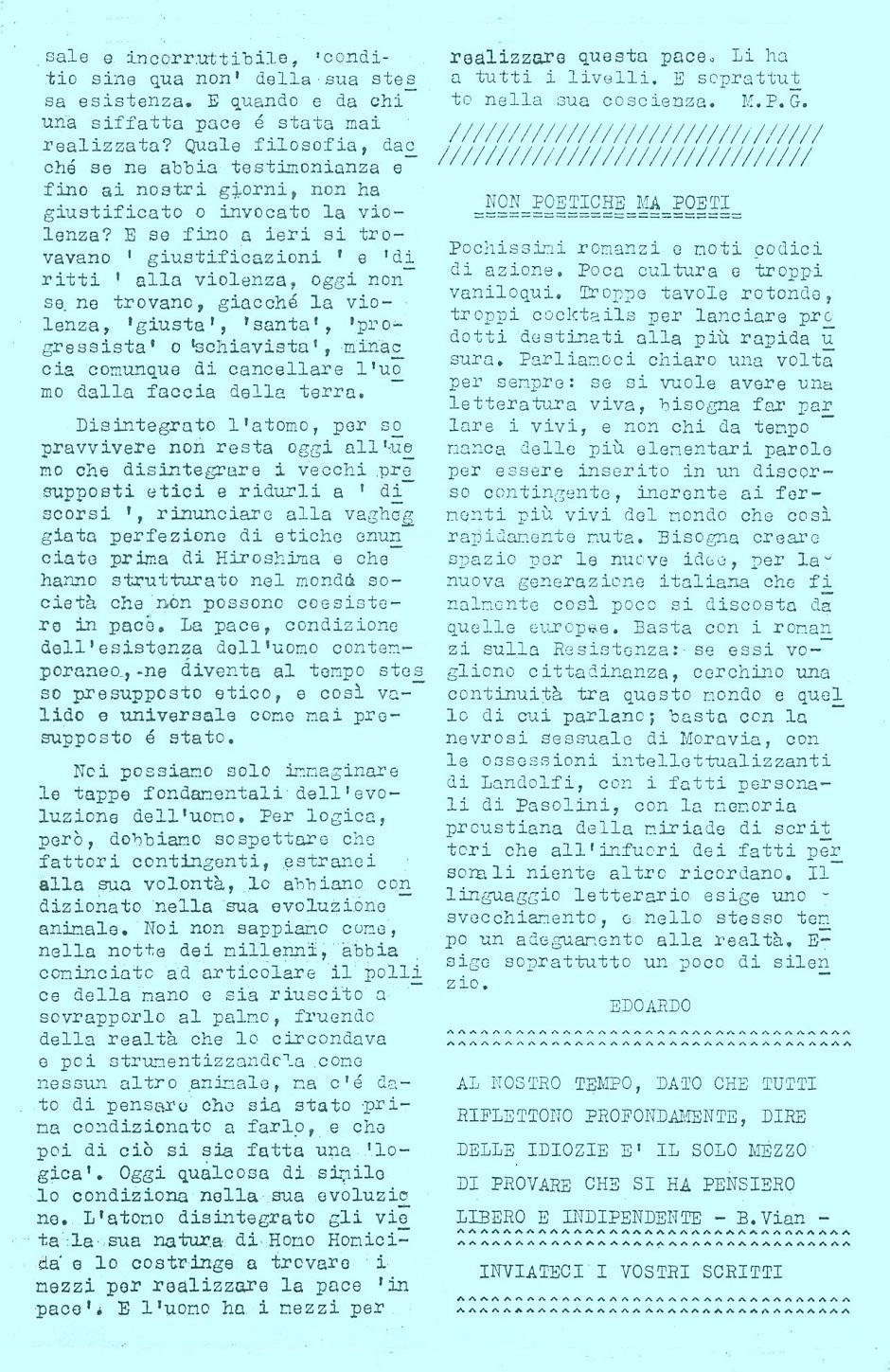
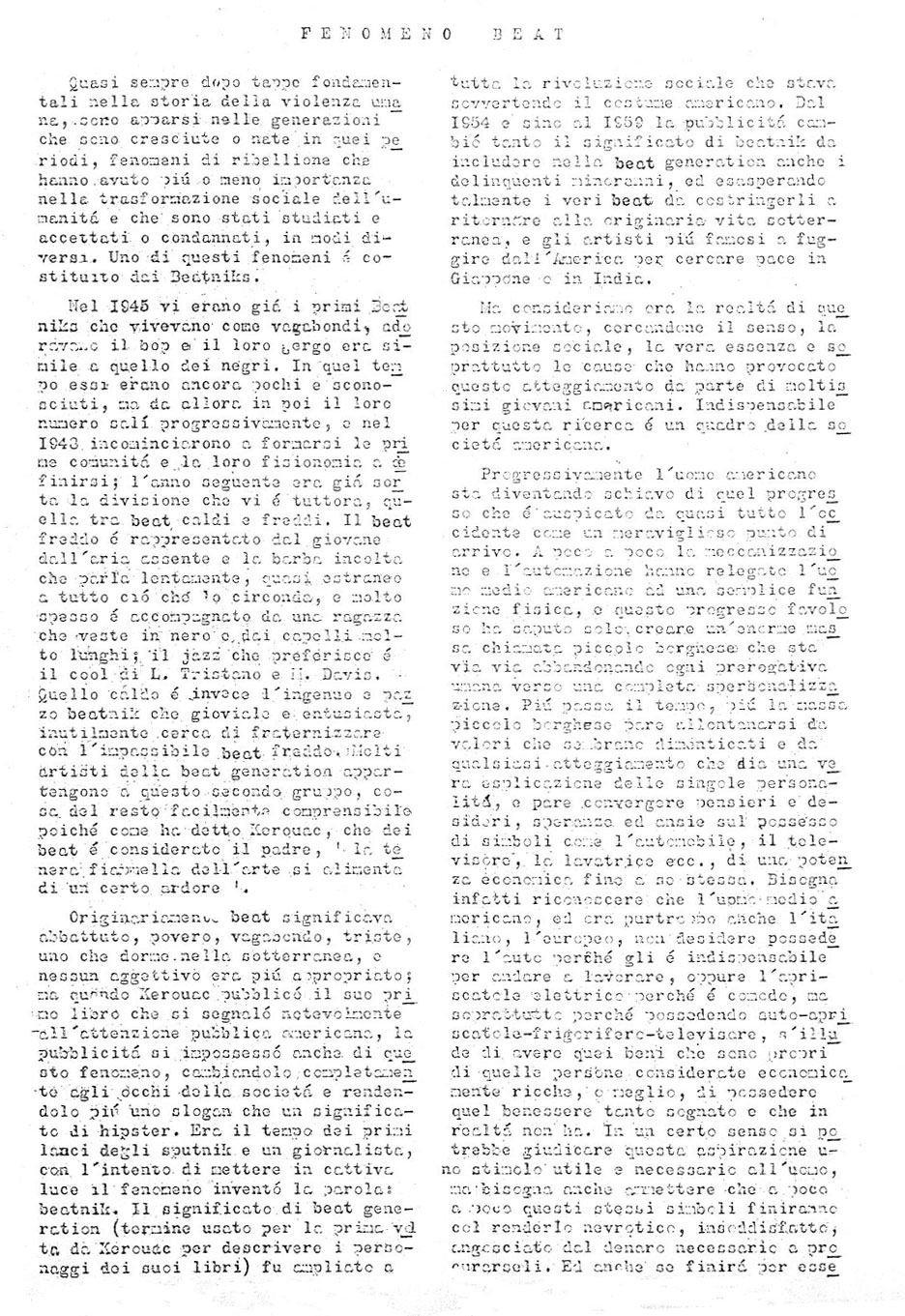
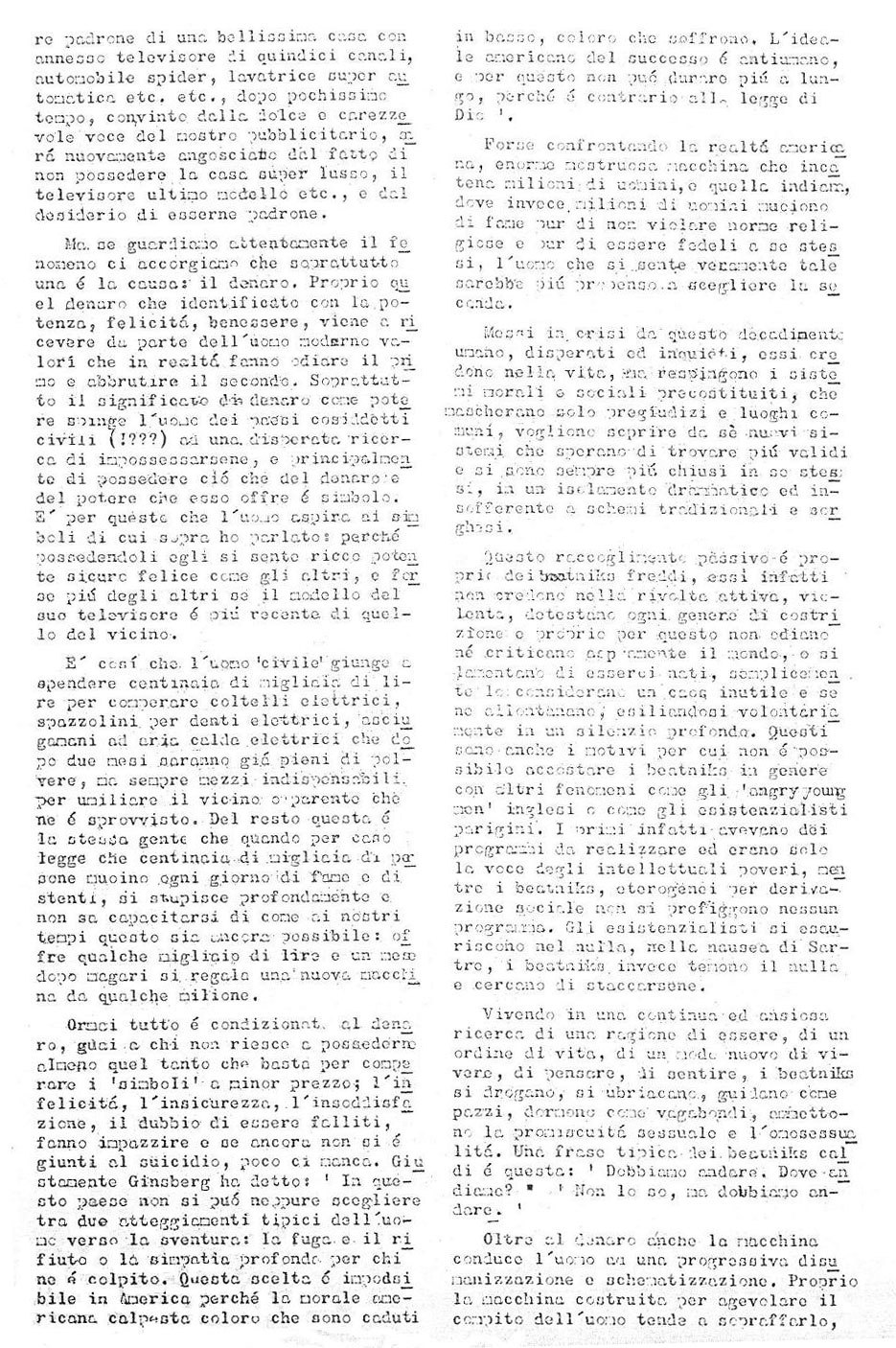
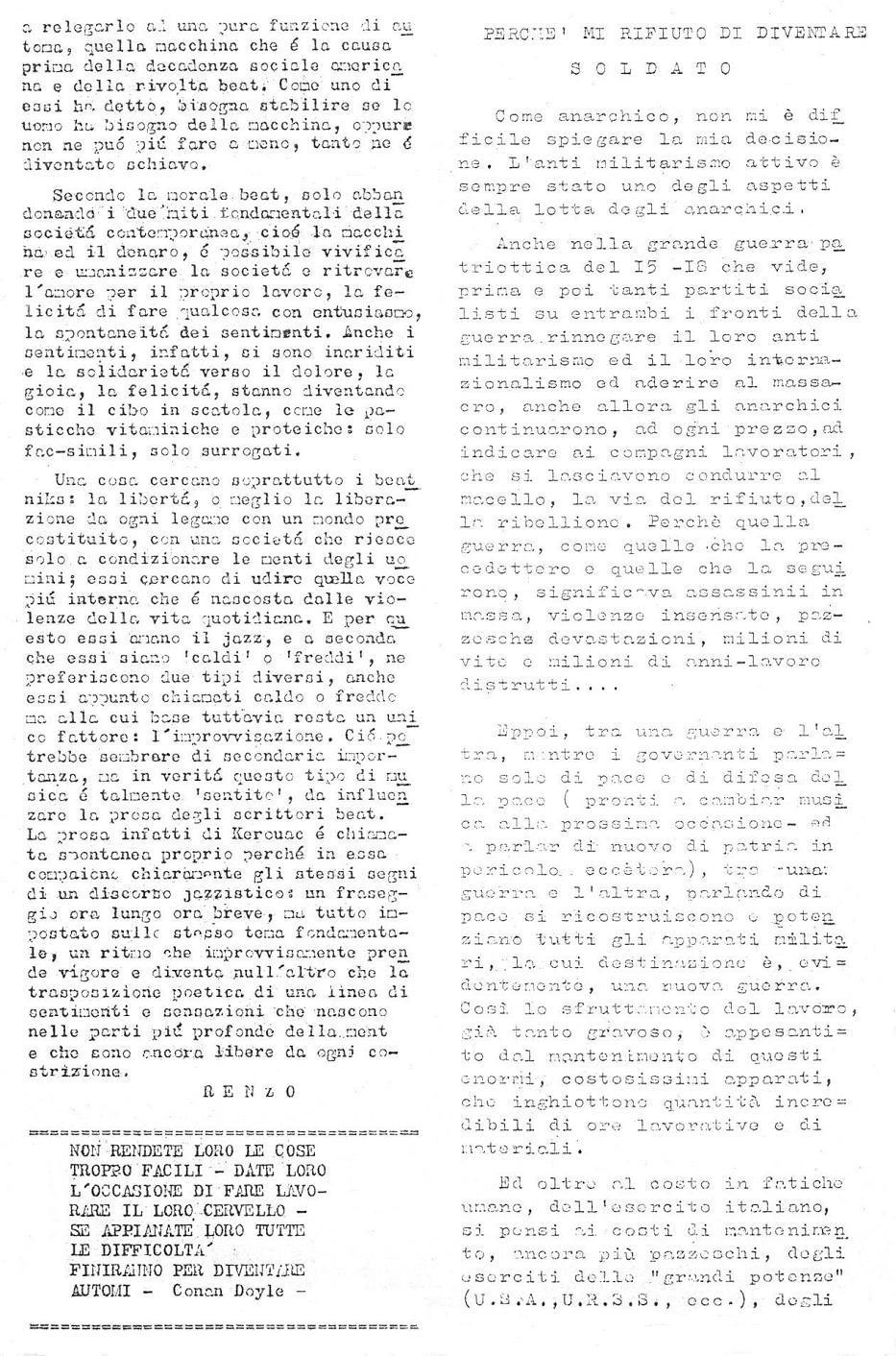
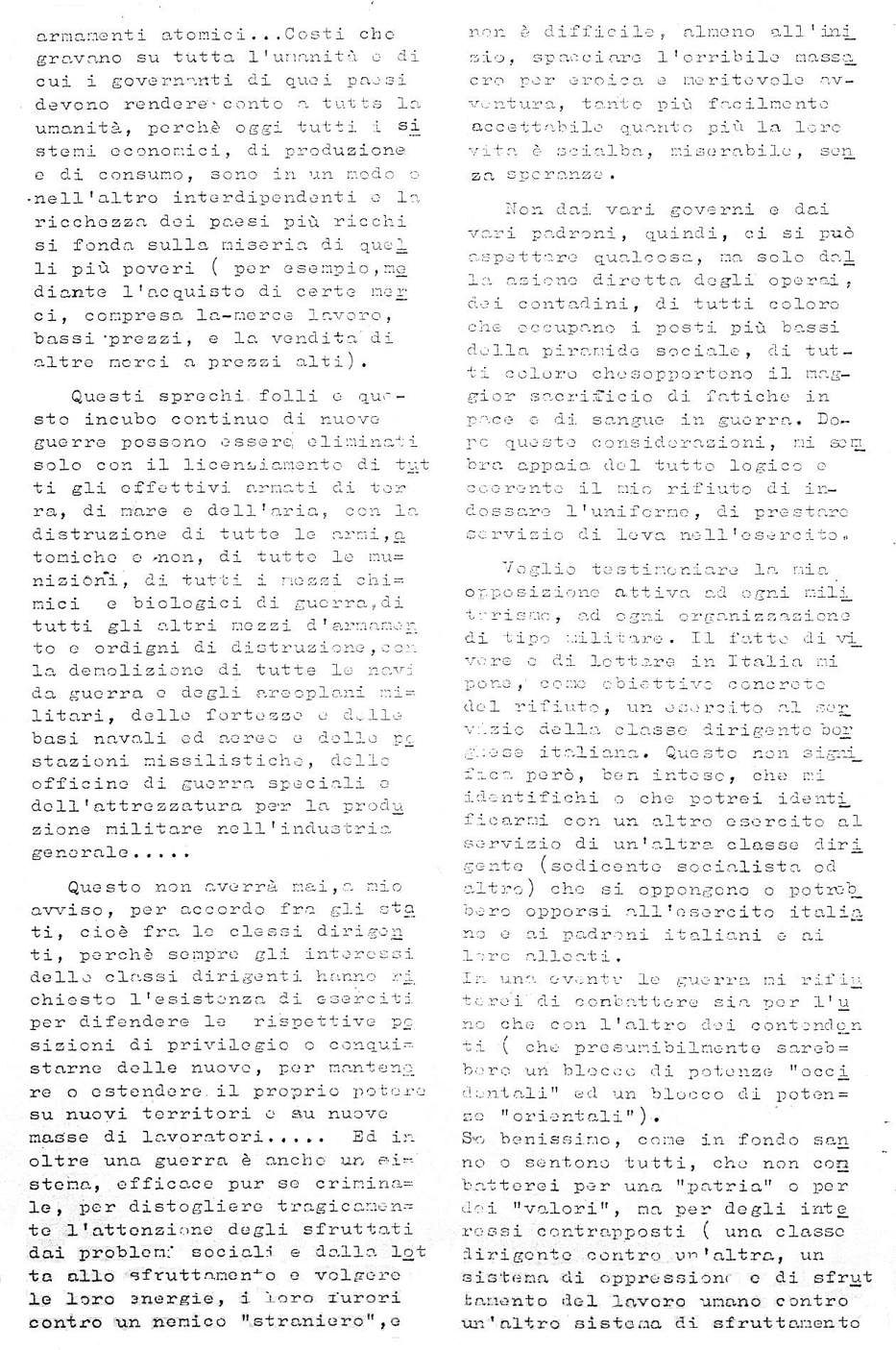
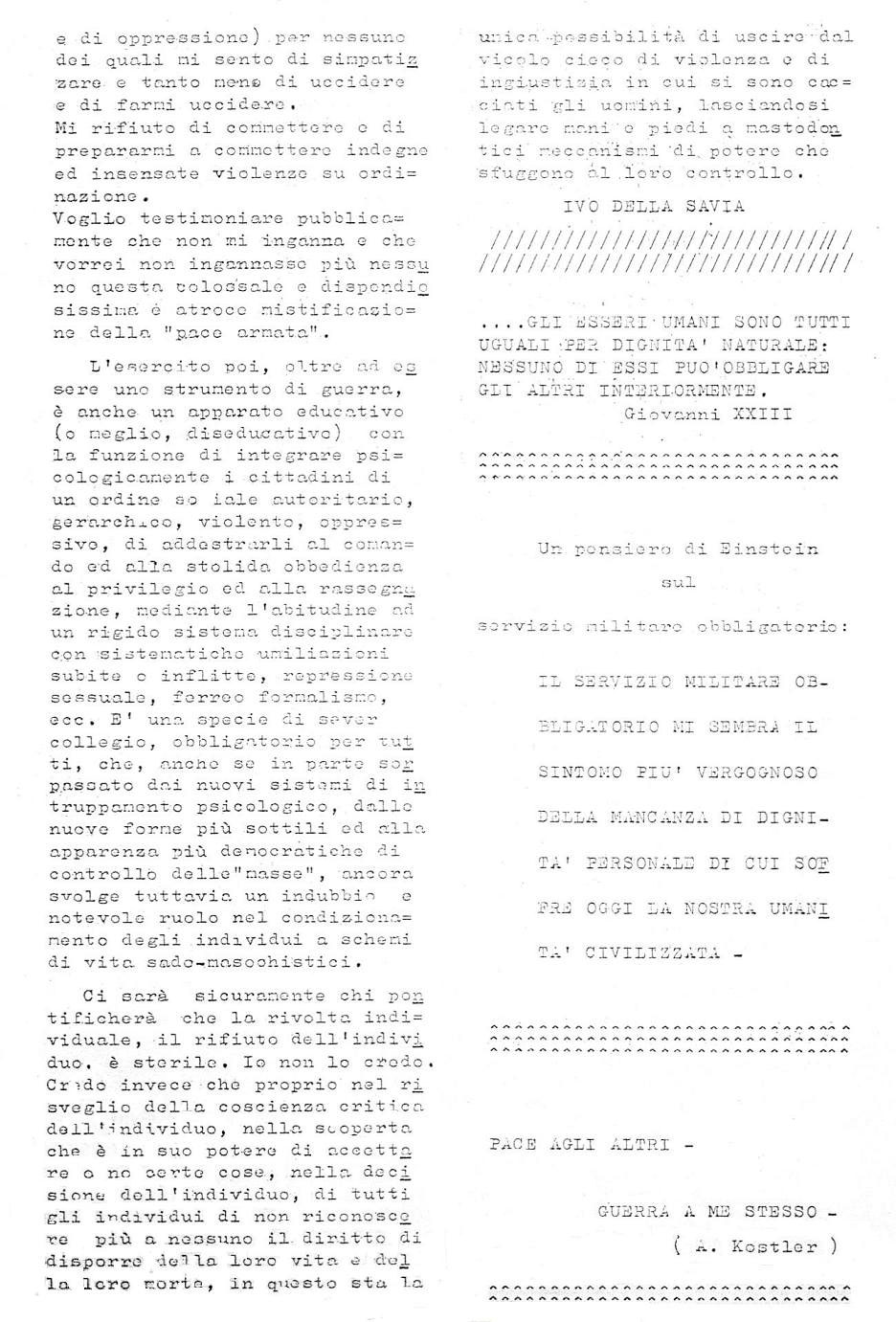
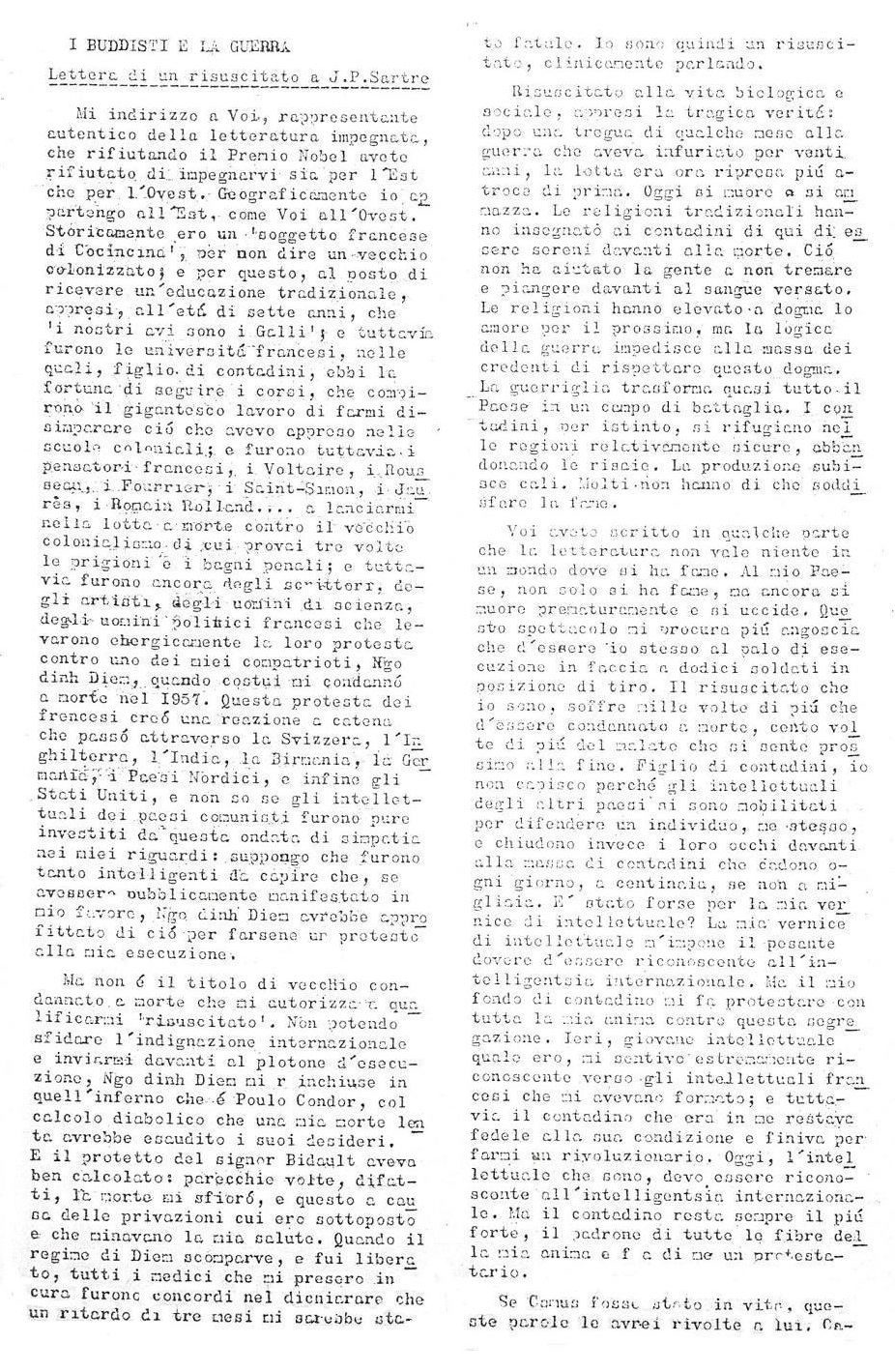
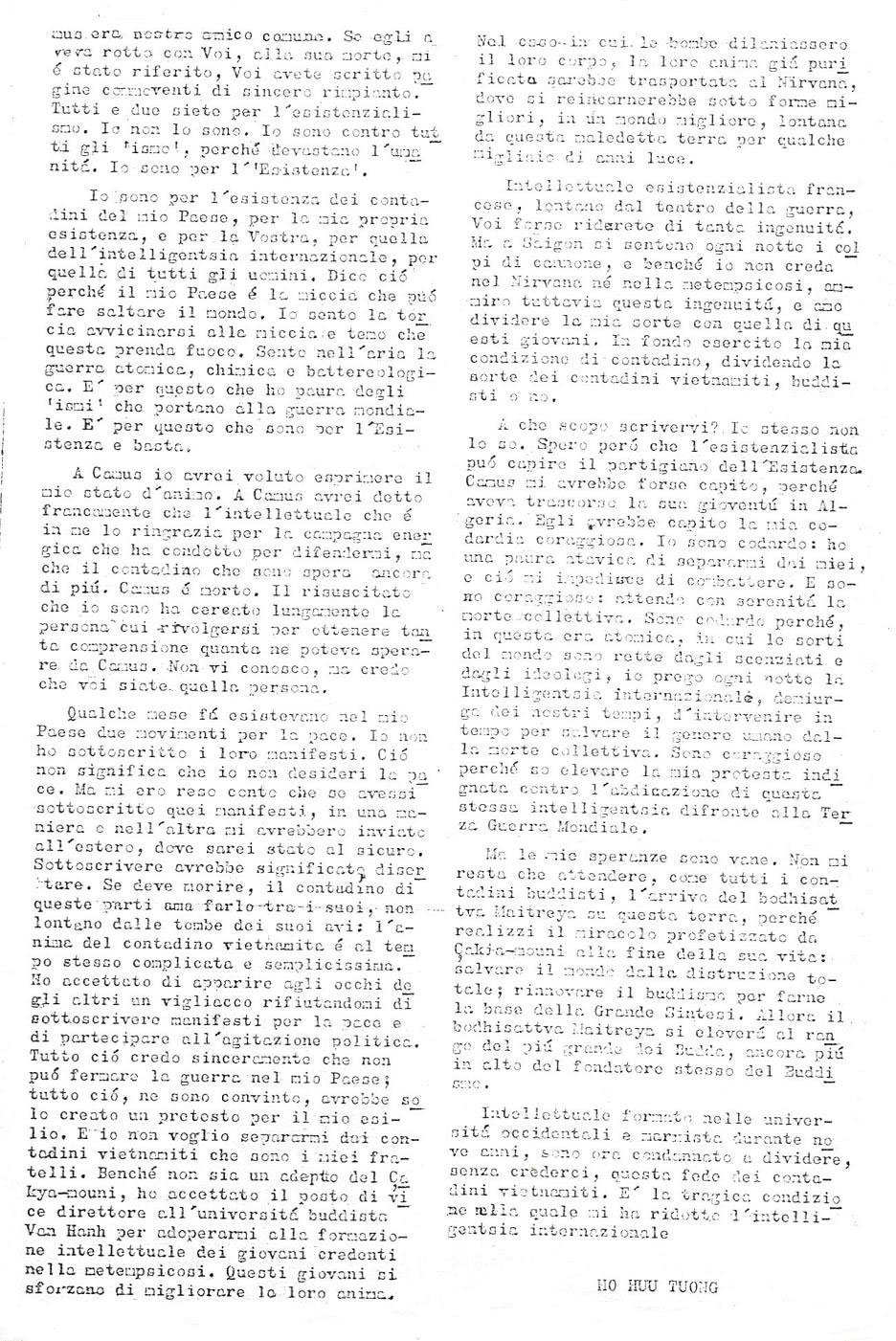
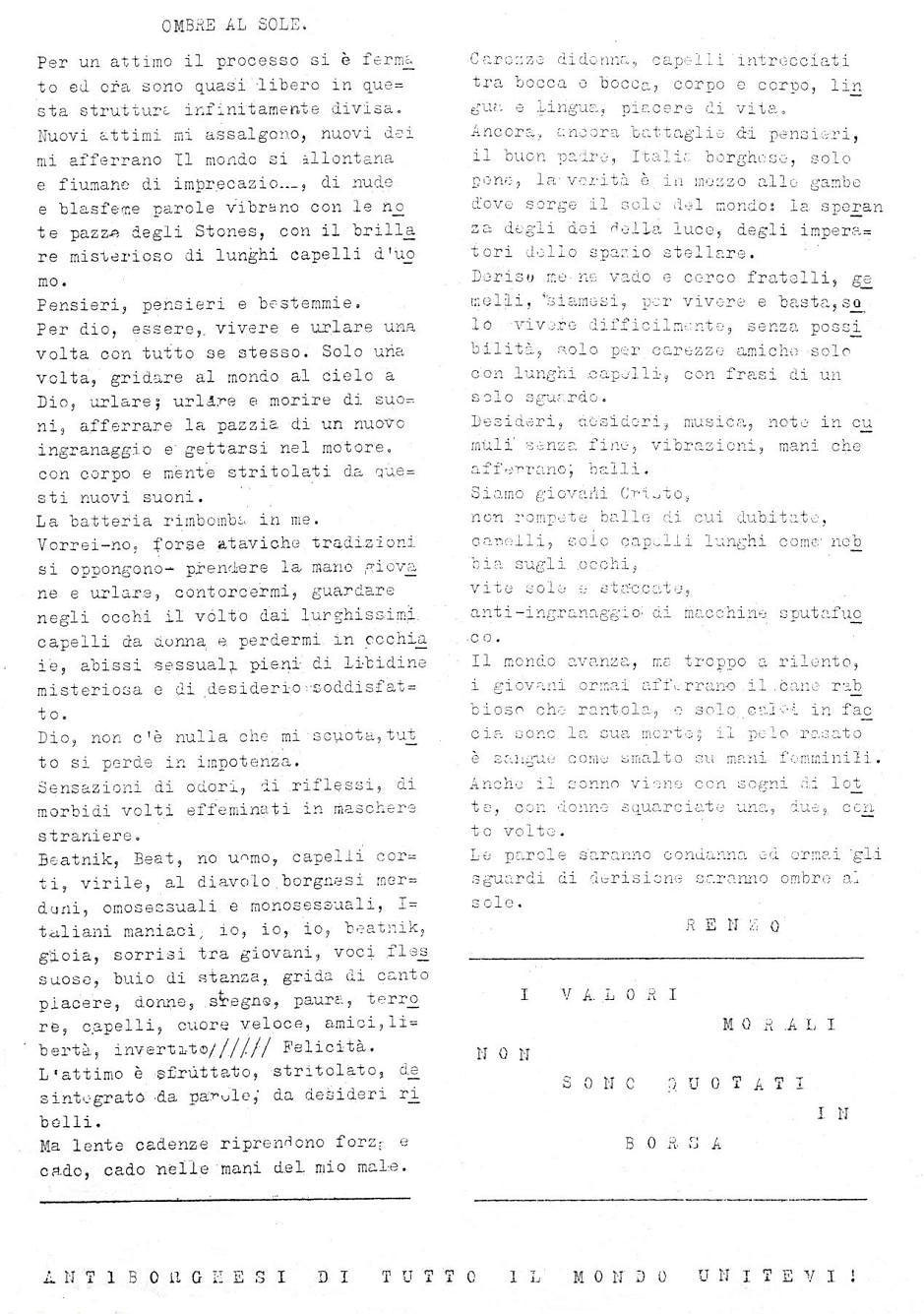
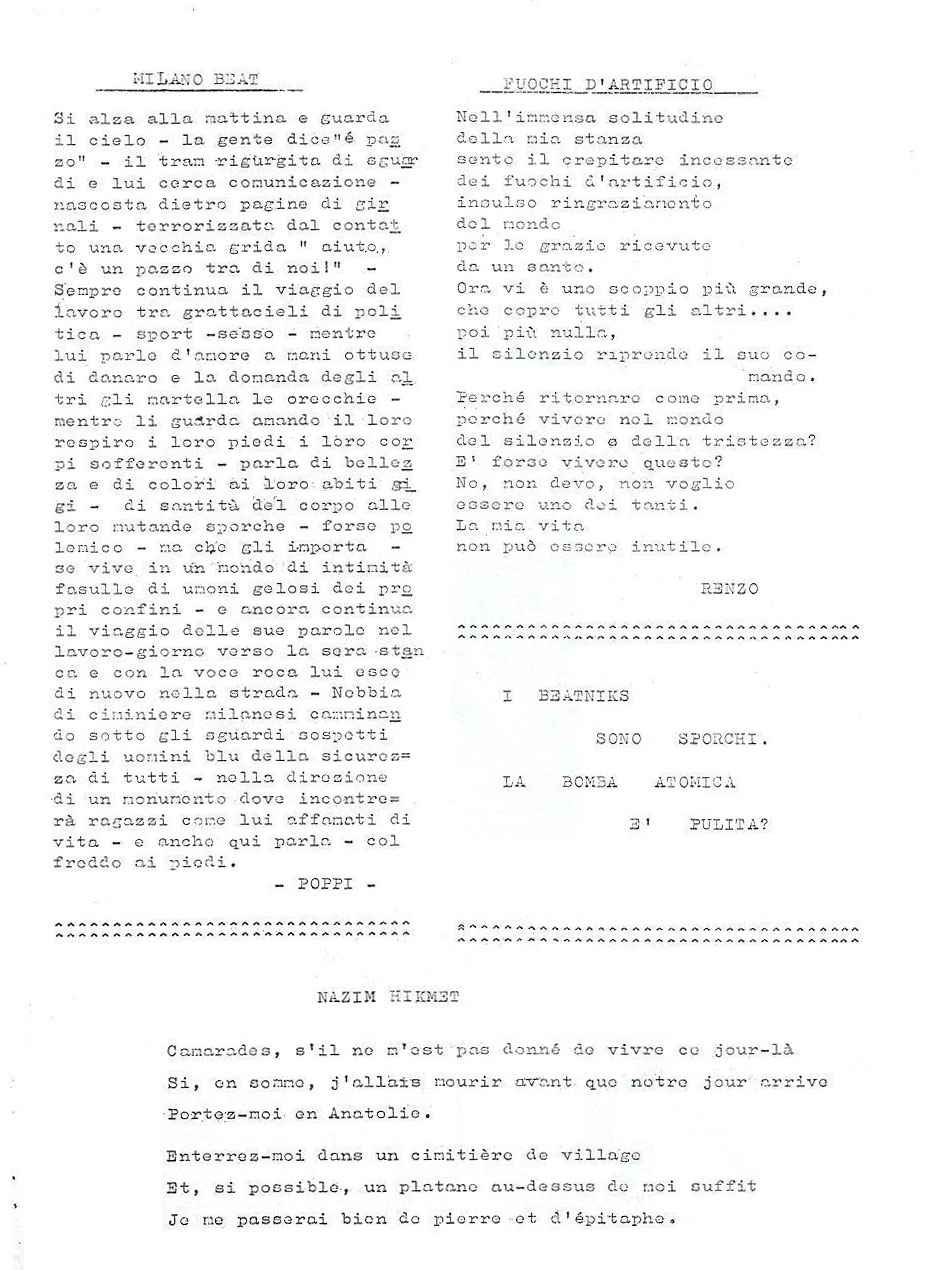
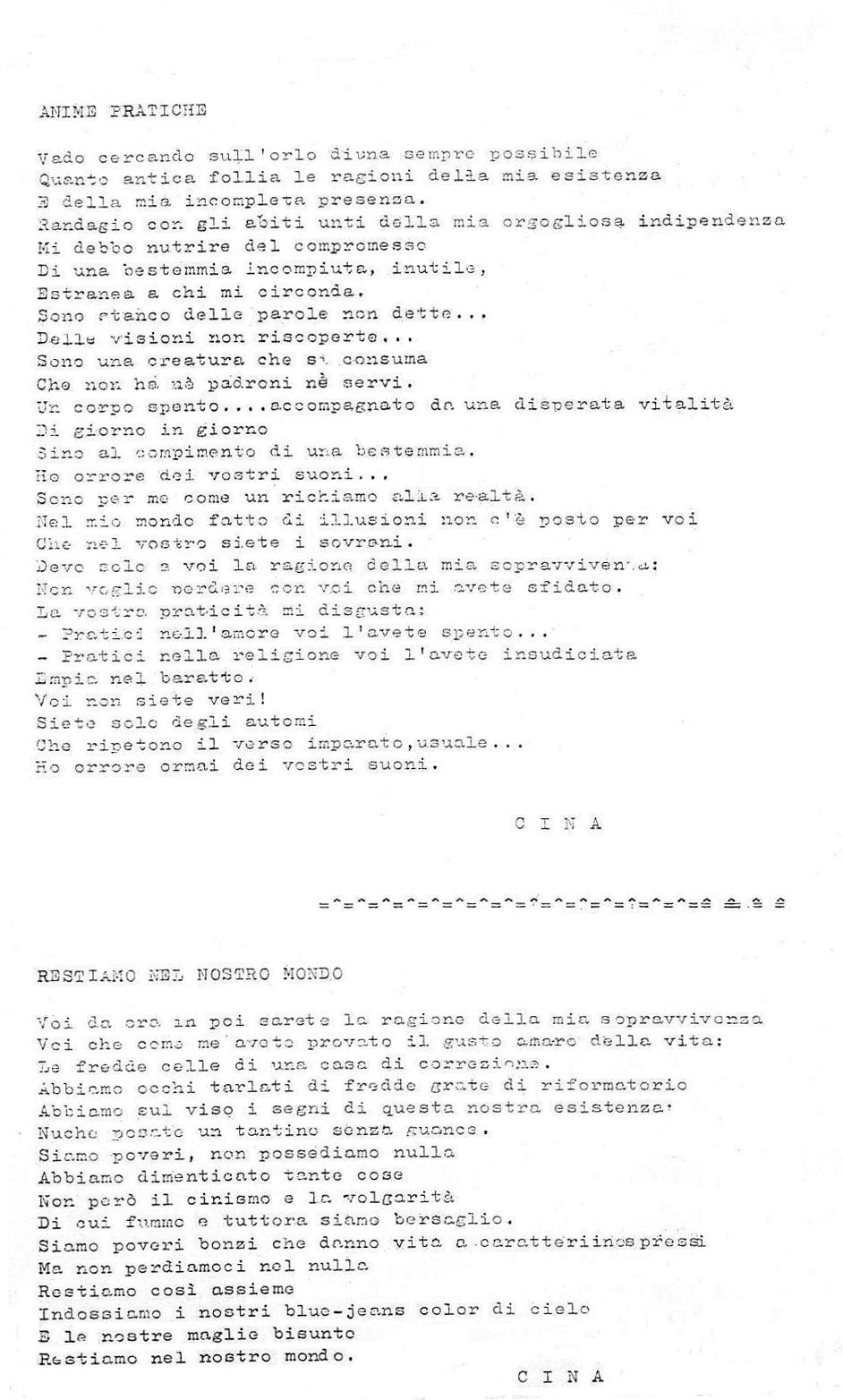
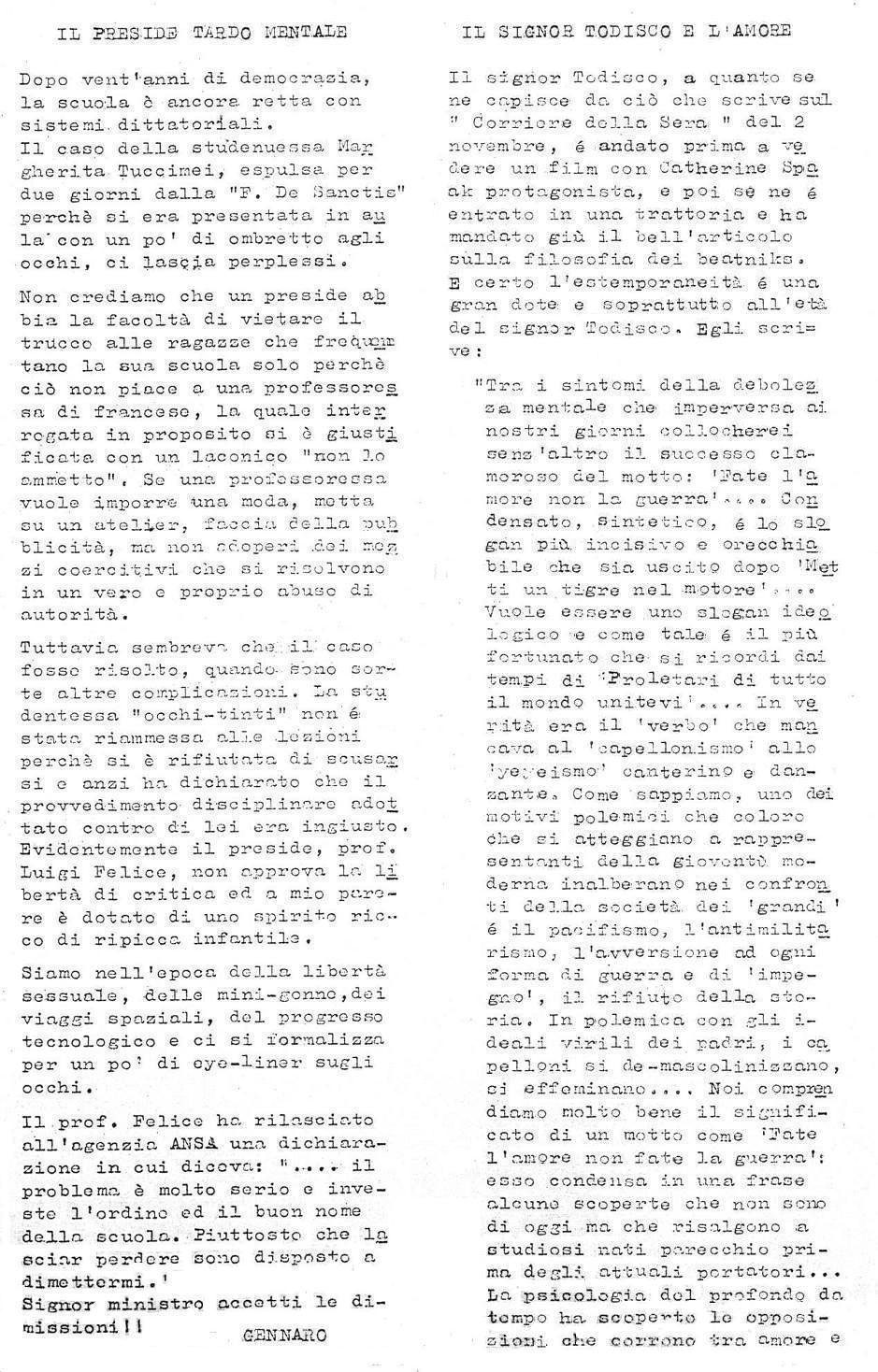
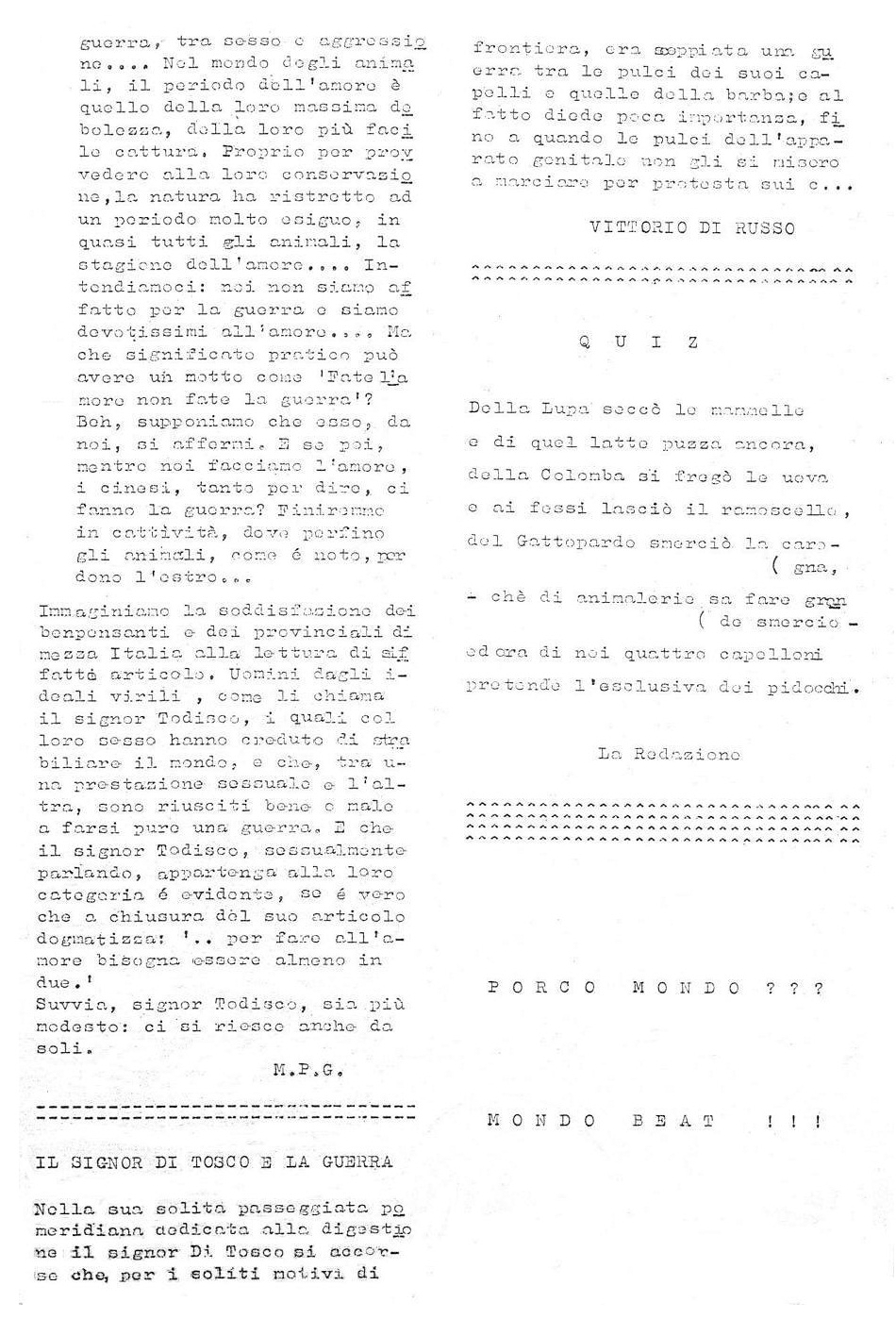
Comments on articles.
page 1-
- The "Mondo Beat" logo was drawn by Enea, a 17-year-old Milanese boy who traced it with a pin on a mimeograph matrix.
- Translation of what is written under the Mondo Beat logo: Management, Administration, Advertising, Milan, Piazza Duomo, at the equestrian statue of (King) Vittorio Emanuele II - This issue is sponsored by the world citizen Vittorio Di Russo, mimeograph assistant and street vendor - Cooperation open to all, with the exception of mental masturbators.
This strip and the editorial were written by Melchiorre Paolo Gerbino (M.P.G.). In the editorial, he advocated nonviolence as a necessity for the survival of humanity, hence the need for a new morality and the maturing of a higher human nature.
page 2-
- Continuation of the editorial by Melchiorre Paolo Gerbino (M.P.G.);
- On the same page 2, "NON POETICHE MA POETI" (No poetics but poets) by Edoardo, on the need for a renewal of Italian literature.
- On the same page 2, a quote from Boris Vian.
page 3-
- "FENOMENO BEAT" (The Beat phenomenon) by Renzo Freschi, an 18-year-old Milanese guy who attended high school.
page 4-
- Continuation of "FENOMENO BEAT" (The Beat phenomenon) by Renzo Freschi.
Renzo Freschi tried to participate in Fernanda Pivano's literary salon with the aim of achieving literary success, but was ignored by her, so he arrived at Mondo Beat.
page 5-
Continuation of "FENOMENO BEAT" (The Beat phenomenon) by Renzo Freschi.
A boy with confused ideas, as unfortunately there were many of them, Renzo Freschi believed that the Beat Generation literature would be relevant to explain the malaise of the Italian youth of his time. Thus, Renzo Freschi wrote pages and pages on the Beat Generation, copying almost integrally what Fernanda Pivano had already published. Fernanda Pivano, who was a CIA agent, had the task of writing on the Beat Generation so that the Italian provincials were distracted by this unharmful topic and did not participate in the Mondo Beat Movement, which instead destabilized power because it engaged in asserting civil rights in Italy. Pathetically, Renzo Freschi, who understood nothing of these subtle games, believed himself to be an avant-garde intellectual!
- On the same page 5, "PERCHÉ MI RIFIUTO DI DIVENTARE SOLDATO" (The reason why I don't want to undergo compulsory military service) by Ivo della Savia. He was an anarchist from the Sacco and Vanzetti section. In this article Ivo della Savia explains the reasons for his refusal to do military service, which was then compulsory in Italy.
page 6-
- Continuation of "PERCHÉ MI RIFIUTO DI DIVENTARE SOLDATO" (The reason why I don't want to undergo compulsory military service) by Ivo della Savia. He lived in hiding, supported by the Milanese anarchists.
page 7-
- Continuation and end of "PERCHÉ MI RIFIUTO DI DIVENTARE SOLDATO" (The reason why I don't want to undergo compulsory military service) by Ivo della Savia.
Ivo della Savia was the first Italian conscientious objector to compulsory military service for ideological reasons. Before him, there were some Jehovah's Witnesses, for religious reasons.
- On the same page 7, a miscellany of quotes on pacifism, by Pope John XXIII, Albert Einstein, Arthur Koestler.
page 8-
- "I BUDDISTI E LA GUERRA. Lettera di un risuscitato a J.P. Sartre" (Buddhists and war. Letter from a resurrected man to J.P. Sartre) by Ho Huu Tuong (translated from French into Italian by Melchiorre Gerbino).
An open letter to Jean-Paul Sartre by a Vietnamese intellectual who was forced by circumstances to live among Buddhists during the Vietnam War.
page 9-
- Continuation of "I BUDDISTI E LA GUERRA. Lettera di un risuscitato a J.P. Sartre" (Buddhists and war. Letter from a resurrected man to J.P. Sartre) by Ho Huu Tuong.
At the time of this open letter's publication, the Vietnam War was at its worst escalation.
page 10-
- "OMBRE AL SOLE" (Shadows in the sun) by Renzo Freschi, who wrote relentlessly and insisted on being published.
page 11-
- "MILANO BEAT" by Giuseppe Poppi Ranchetti. He attended Mondo Beat in the early days. In this writing the young Poppi expressed his annoyance at being among too many robotic people.
- On the same page 11, some verses by Nazim Hikmet.
- On the same page 11, Renzo Freschi again, with "FUOCHI D'ARTIFICIO" (Fireworks).
A reflection on the situation created by Renzo Freschi regarding Mondo Beat magazine. This issue was made up of 14 pages, 4 of which were covered by Renzo Freschi's non interesting writings. Now, if we had published only the shortest of his writings, this issue could have been formatted in 10 pages, instead of 14, and it would have been more characterized and stylish. But Mondo Beat, being an anarchist magazine, never refused articles submitted for publication and this situation of welcoming all and publishing anyone at his will, would have been a heavy burden for the magazine, as we will see.
page 12-
- "ANIME PRATICHE" (Practical souls) and "RESTIAMO NEL NOSTRO MONDO" (Let's remain in our world) by Cina (China). He was nicknamed China because of his slightly Mongolian facial features. In these two poems, there are the bitter memories of someone who was locked up in a reformatory in his tender years. China, of whom none knew the real name, was a close friend of Vittorio Di Russo.
page 13-
- "IL PRESIDE TARDO MENTALE" (The mentally retarded principal) by Gennaro De Miranda. It was a harsh criticism of the school system in Italy. Gennaro De Miranda, a 36-year-old Neapolitan, was the magazine's oldest contributor.
- On the same page 13, "IL SIGNOR TODISCO E L'AMORE" (Mr. Todisco and Love) by M.P.G. (Melchiorre Paolo Gerbino) with the intention of making fun of Alfredo Todisco, journalist of Corriere della Sera
page 14-
- Continuation of "IL SIGNOR TODISCO E L'AMORE" (Mr. Todisco and Love) by M.P.G. (Melchiorre Paolo Gerbino).
- On the same page, "IL SIGNOR DI TOSCO E LA GUERRA" (Mr. Di Tosco and War) by Vittorio Di Russo.
With these two writings, Melchiorre Gerbino and Vittorio Di Russo, respectively, made fun of Alfredo Todisco, a journalist from Corriere della Sera who wrote nonsense about the Beats.
Note that this writing by Vittorio Di Russo is the only one published in Mondo Beat magazine. Vittorio Di Russo assiduously carved and painted but did not write much.
- On the same page 14, "QUIZ", signed "La Redazione" (The editorial staff). Melchiorre Gerbino wrote it to make fun of Giangiacomo Feltrinelli's publishing house, which sold buttons with protest writings, which provincial Italians pinned on their clothes.















